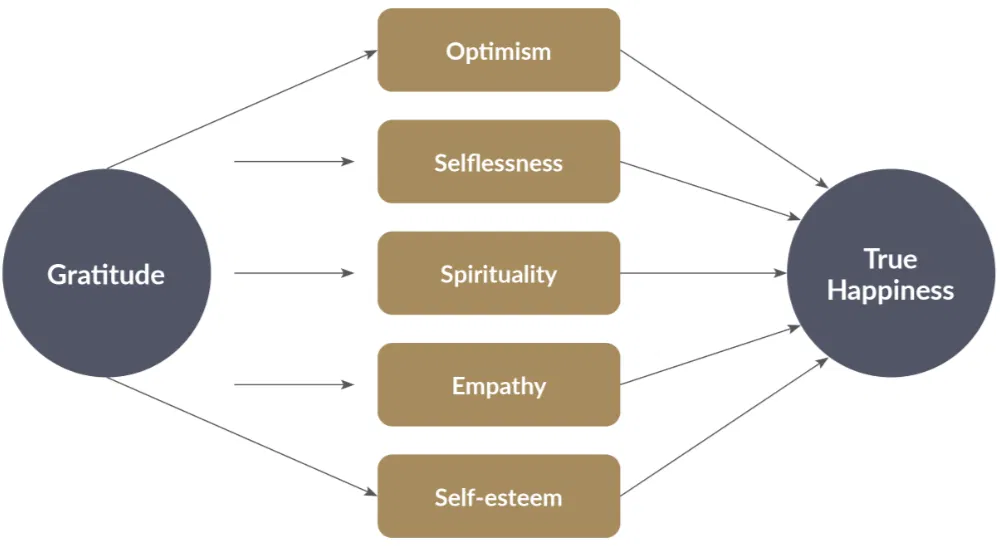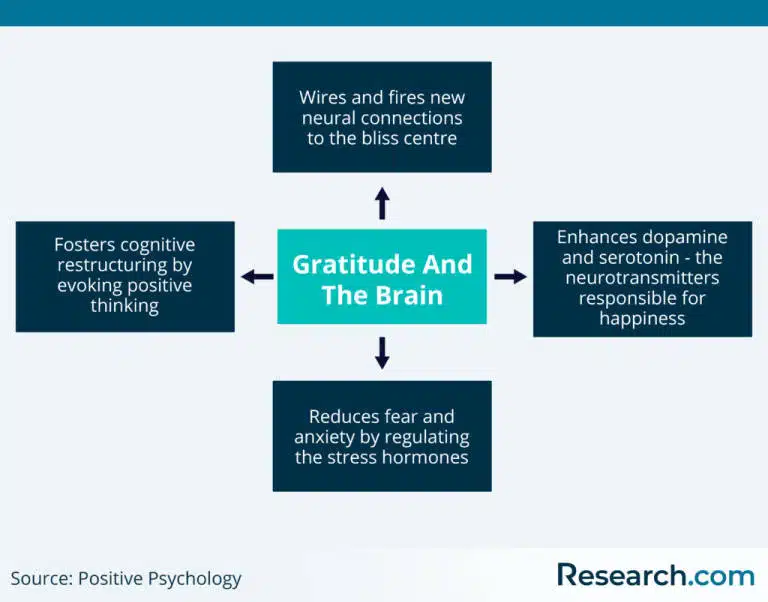The connection between gratitude and mental health packs more power than you might expect. Research shows a simple act of genuine gratitude can boost happiness by 10% and reduce depressive symptoms by 35%. These numbers truly amazed me when I first found them. That such a simple practice could transform our mental state.
Gratitude offers more than just a quick happiness fix. People who take time to count their blessings experience greater happiness and fewer depressive episodes. Research backs this up – participants who practiced gratitude for 12 weeks showed more optimism, exercised more frequently, and made fewer doctor visits compared to people who dwelled on daily frustrations. This makes gratitude a powerful shield against depression and anxiety.
This post dives deep into the fascinating science of how gratitude rewires your brain. You’ll learn about the mental health benefits that come from regular practice and simple ways to make gratitude part of your daily routine. The link between gratitude and mental health could transform your life, whether you face mental health challenges or want to boost your emotional wellbeing.
The Science Behind Gratitude And Mental Health
 Image Source: Positive Psychology.com
Image Source: Positive Psychology.com
Your brain responds remarkably to gratitude. Expressing thankfulness triggers your brain to release dopamine and serotonin—powerful neurotransmitters that boost happiness and contentment [1]. These “feel-good” chemicals create a positive feedback loop and reinforce the behavior that sparked your gratitude.
Scientists have discovered specific neural regions light up with gratitude. Your medial prefrontal cortex, which handles learning and decision-making, becomes more active when you feel grateful [2]. The right anterior temporal cortex processes moral judgments about gratitude [1]. People who keep practicing gratitude show a higher volume of gray matter in their right inferior temporal gyrus [1].
Gratitude activates your amygdala and hippocampus—brain areas that control emotions, memory, and bodily functions [3]. This activation explains why gratitude works so well for mental health. Your brain literally switches from stress mode to happiness mode when you focus on appreciation.
Stress reduction stands out as a key neurological benefit. Research shows grateful people have much lower levels of cortisol, the stress hormone [1]. The parasympathetic nervous system kicks in during gratitude practice and promotes a “rest and digest” state instead of “fight-or-flight” [4]. Heart rates drop substantially during gratitude intervention compared to resentment intervention [5].
Your brain’s adaptability, known as neuroplasticity, makes gratitude even more powerful. Regular gratitude practice reshapes neural pathways. Neuroscientists often say “neurons that fire together wire together“ [6]. Participants showed increased activation in their medial prefrontal cortex after three months of practicing gratitude [4]. This proves gratitude can create lasting changes in brain function.
Gratitude impacts how different brain regions connect, especially in emotion and motivation networks [5]. This explains why gratitude’s benefits go beyond temporary happiness and create lasting improvements in how we see and interact with the world.
The Benefits of Gratitude for Mental Wellness

Image Source: Marion County Hospital District
Gratitude does more than just make you feel good momentarily. Research shows that grateful practices create real improvements in many aspects of psychological wellbeing.
People who practice gratitude regularly experience fewer symptoms of depression and anxiety. Studies show gratitude-based activities result in 6.89% lower depression scores [7] and 7.76% lower anxiety scores [7] compared to control groups. The benefits are quick to appear. People who kept gratitude journals for just 10 weeks felt more optimistic. They also exercised more and visited their doctors less frequently [8].
Your stress levels drop when you practice gratitude. Research proves that grateful thoughts lower cortisol—our body’s main stress hormone—by about 23% [9]. This prevents many health issues like anxiety, depression, digestive problems, and poor sleep. Gratitude works by breaking negative thought patterns and helps you focus on life’s positive aspects.
Beyond easing negative feelings, gratitude builds psychological resilience. Research participants who practiced gratitude showed:
- Greater life satisfaction (6.86% higher scores) [7]
- Better overall mental health (5.8% higher scores) [7]
- Improved sleep quality and duration [10]
- Better emotional stability and self-esteem [11]
The benefits of gratitude grow stronger over time. The original effects might seem small, but studies reveal that continued practice guides you to bigger mental health improvements at 4 weeks and even better results at 12 weeks [2]. This shows how gratitude rewires your brain’s pathways to create lasting positive changes in how you think.
The great thing is that these benefits are available to everyone—even those who struggle with mental health issues. Clinical studies prove that combining gratitude with regular psychological counseling works better than counseling alone [2]. This suggests gratitude can work well alongside traditional mental health treatments.
 4 Simple Ways to Practice Gratitude (Even on Hard Days)
4 Simple Ways to Practice Gratitude (Even on Hard Days)
Making gratitude part of your daily life takes dedication and steady practice. Random thank-yous don’t work as well as proven techniques that help you notice and value more things around you.
Tip #1
Journaling with purpose remains one of the most available ways to practice gratitude. Your gratitude journal becomes more meaningful when you:
- Write exactly what you value
- Choose quality over quantity
- Link entries to your emotions rather than just facts
- Think about how life would feel without certain blessings (such as running tap water or central heating)
The best results come from writing at the same time each day, but don’t worry about hitting a specific number of entries. Research shows your emotional connection matters more than how much you write [12].
Tip #2
Gratitude meditation gives you another great way to practice. You should first find a quiet spot and center yourself with slow breaths. Then picture specific people, experiences, or things you value, and let yourself feel the emotions fully. A quick 5-minute session that focuses on your senses can make a real difference [13].
Tip #3
Telling people directly how much you value them helps close what researchers call the “gratitude gap” [14]. Heartfelt notes that point out specific actions show how they made your life better. This active approach adds more mental health benefits than just thinking grateful thoughts [15].
Tip #4
Families can create a gratitude jar to share appreciation together. Everyone writes their thankful thoughts on paper slips, adds them to a container and reads them as a group now and then [16].
Beyond these organized practices, you can weave gratitude into your day through mindful walks, counting blessings, or taking quick moments to spot something good. The real power of gratitude doesn’t come from big gestures but from staying aware of life’s gifts—both simple and amazing.
Signing Off with a Smile
A powerful connection between gratitude and mental health makes appreciation the life-blood of our daily routine. I hope my post reveals how this simple practice creates remarkable benefits for our brain and overall wellbeing. Research proves that gratitude practices decrease depression and anxiety symptoms. They also boost happiness, optimism, and resilience.
The science behind these benefits stands clear. Gratitude changes our brain chemistry by triggering dopamine and serotonin release, which creates positive feedback loops that strengthen our appreciation. This practice lowers cortisol levels, activates our parasympathetic nervous system, and rewires neural pathways to create lasting positive changes.
Gratitude remains available to everyone. You can practice it through thoughtful journaling, mindful meditation, direct expressions of thanks, or family gratitude jars. These methods are great ways to foster this powerful mental health tool. You don’t need special equipment, expensive therapy, or extraordinary circumstances – just be willing to notice and appreciate the little things around you.
Of course, building a consistent gratitude practice needs some effort at first. In spite of that, the rewards are worth the small investment of time and attention. Better sleep, increased emotional stability, reduced stress, and improved mental health await you.
Start your own gratitude experience today and take this research to heart. Your brain becomes more resilient, positive, and healthy with each expression of thanks. This simple yet revolutionary mental health practice works one moment of appreciation at a time.
Ready to rewire your brain for the better? Start a simple gratitude habit today—try listing three things you’re thankful for right now. Then share this post to inspire someone else to do the same.
I would love to hear your comments and thoughts…And if you liked the post, feel free to share!
Peace & blessings
Teresa



